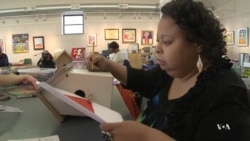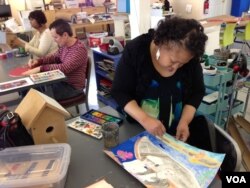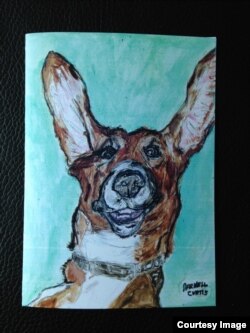Vanessa Monroe is a visual artist who draws inspiration from the world around her.
Today she’s painting a wooden birdhouse at an art studio in Washington, D.C., that helps artists with disabilities express and support themselves.
Monroe has a mild intellectual disability, the result of a rare genetic disorder. But that hasn’t stopped her from creating intricate, one-of-a-kind-pieces that are in high demand at home as well as overseas. In addition to her birdhouse, she’s also finishing off a colorful watercolor depicting a bride and groom that she created for an international client.
“I finished my commission about two married couples,” she announced triumphantly. “It makes me proud and it makes me feel good inside.” Mara Clawson, 22, likes to
create images with nature-based themes.
“I started drawing watercolors since I was two or three," she said. "I just love art.”
Clawson also suffers from a hereditary disease that has resulted in a mild learning disability, but she doesn’t think about that when she’s in the studio with other artists.
“It’s nice and peaceful and we can get along with each other,” she said.
Art Enables
The two women are regular participants in a program at Art Enables, a non-profit gallery and studio in Washington.
Now in its 12th year, the gallery offers an open, quiet space to about 30 local artists with a variety of intellectual or developmental disabilities that include but are not limited to Down Syndrome, Autism, Traumatic Brain Injury and Bipolar Disorder.
The artists come from all backgrounds and ethnicities and range in age from 21 to 78 years old.
Mary Liniger, Executive Director of Art Enables, said the purpose of the program is twofold; “to represent and support our artists and then also to show the different ways that people who are marginalized can communicate through the visual arts.”
Professional artists
The gallery provides the artists with professional materials, their own web page, and marketing support to help them succeed as professional artists. “Our artists have at least 10 shows a year here as well as other shows throughout the city,” she said, “and whenever our artists sell a piece, whether it’s here in the gallery, off of our website or at one of their outside shows, they receive a 60 percent commission from those sales.”
The artists' work ranges from original, framed pieces to mugs, calendars and notecards depicting their work. They also receive numerous orders from around the world.
“We have had buyers as far away as Germany, Japan, Australia,” said Liniger. “Last year we sold over $84,000 worth of artwork and our average piece is around $100.”
“Having people recognize the talents and the skills of these artists is really important,” she added; “it’s a source of identity and of pride.”
Art Coordinator Beth Baldwin is there for support, and to encourage the artists with projects that she thinks are going to be marketable.
“For me as an artist too, just the whole aspect of documenting your work and publicizing your work and getting your work framed and out there into the public is a huge drain on your [re]sources,” she said. “And for our artists to just be able to come in and create and that’s the only thing they have to worry about and concern themselves with, is fantastic.”
Vanessa Monroe appreciates the support.
“I feel real good," she said, “’cause I’m drawing my art and I’m selling it.”
And that, said Beth Baldwin, is what Art Enables is all about.
Today she’s painting a wooden birdhouse at an art studio in Washington, D.C., that helps artists with disabilities express and support themselves.
Monroe has a mild intellectual disability, the result of a rare genetic disorder. But that hasn’t stopped her from creating intricate, one-of-a-kind-pieces that are in high demand at home as well as overseas. In addition to her birdhouse, she’s also finishing off a colorful watercolor depicting a bride and groom that she created for an international client.
“I finished my commission about two married couples,” she announced triumphantly. “It makes me proud and it makes me feel good inside.” Mara Clawson, 22, likes to
create images with nature-based themes.
“I started drawing watercolors since I was two or three," she said. "I just love art.”
Clawson also suffers from a hereditary disease that has resulted in a mild learning disability, but she doesn’t think about that when she’s in the studio with other artists.
“It’s nice and peaceful and we can get along with each other,” she said.
Art Enables
The two women are regular participants in a program at Art Enables, a non-profit gallery and studio in Washington.
Now in its 12th year, the gallery offers an open, quiet space to about 30 local artists with a variety of intellectual or developmental disabilities that include but are not limited to Down Syndrome, Autism, Traumatic Brain Injury and Bipolar Disorder.
The artists come from all backgrounds and ethnicities and range in age from 21 to 78 years old.
Mary Liniger, Executive Director of Art Enables, said the purpose of the program is twofold; “to represent and support our artists and then also to show the different ways that people who are marginalized can communicate through the visual arts.”
Professional artists
The gallery provides the artists with professional materials, their own web page, and marketing support to help them succeed as professional artists. “Our artists have at least 10 shows a year here as well as other shows throughout the city,” she said, “and whenever our artists sell a piece, whether it’s here in the gallery, off of our website or at one of their outside shows, they receive a 60 percent commission from those sales.”
The artists' work ranges from original, framed pieces to mugs, calendars and notecards depicting their work. They also receive numerous orders from around the world.
“We have had buyers as far away as Germany, Japan, Australia,” said Liniger. “Last year we sold over $84,000 worth of artwork and our average piece is around $100.”
“Having people recognize the talents and the skills of these artists is really important,” she added; “it’s a source of identity and of pride.”
Art Coordinator Beth Baldwin is there for support, and to encourage the artists with projects that she thinks are going to be marketable.
“For me as an artist too, just the whole aspect of documenting your work and publicizing your work and getting your work framed and out there into the public is a huge drain on your [re]sources,” she said. “And for our artists to just be able to come in and create and that’s the only thing they have to worry about and concern themselves with, is fantastic.”
Vanessa Monroe appreciates the support.
“I feel real good," she said, “’cause I’m drawing my art and I’m selling it.”
And that, said Beth Baldwin, is what Art Enables is all about.







